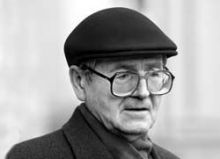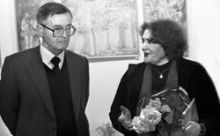On Nov. 17, 2006 a roundtable on “The Phenomenon of Ivan Dziuba” took place at the Ukrainian Home. It was organized by the National Council on Issues of Culture and Spirituality, a body attached to the president of Ukraine; Kyiv-Mohyla Academy; the Shevchenko Institute of Literature at the National Academy of Sciences of Ukraine; and the Kyiv- Mohyla Academy publishing house.
Well-known Ukrainian poets, writers, human rights advocates, historians, and literary critics were invited to speak, among them Lina Kostenko, Yevhen Sverstiuk, Mykhailyna Kotsiubynska, Mykola Ilnytsky, Volodymyr Panchenko, Oksana Pakhliovska, Mykola Zhulynsky, Yurii Shapoval, Vasyl Herasymiuk, Vitalii Donchyk, Hryhorii Syvokin, and others.
The Day decided to participate in the roundtable in a manner germane to newspapers-we queried our readers and experts on the Dziuba phenomenon, and his work as a literary and cultural critic, philosopher, and public figure. Virtually everyone spoke on the topic of “My Dziuba,” irrespective of their personal acquaintance with the author of the landmark work Internationalism or Russification?
Each of us has a different image of him. But he is one of those individuals to whom we are all indebted for our country’s independence. In the mid-1960s, the period of the nascent Ukrainian national dissident movement, his book Internationalism or Russification? was the moment of truth. It provided the ideological foundation and immense moral support for the champions of the spiritual, and later political, independence of Ukraine.
That was then. Does the same hold true today?
Viktor PUSHKIN, rector of Dnipropetrovsk National Mining University:
“The phenomenon of Ivan Dziuba lies in his public stance. First of all, he has been able to retain his self-respect in all circumstances and under any political regimes. He has always been truthful and stood for the truth. In some situations he preserved some naivete but, like all of us, also belief in the social order in which we lived and worked. Second, what the things he wrote about and defended were burning issues of the 1960s. Third, his position has been correct and his views deferential. In stating his opinions and even in contrasting Russian and Ukrainian cultures, he has always been respectful. He handled all these subjects sensitively, as befits an intellectual. He is a living example and a lesson to contemporaries. Dziuba never bows down to anyone, always tells the truth, and says what he thinks, whether it is convenient or not. This kind of public stance simply wins me over.
“I am very disturbed by our young people’s attitude to Dziuba. The problem is that they are barely acquainted with this classical figure. He is not the only one; they know little about Serhii Krymsky; they don’t read Kostenko, and so on. But we ourselves do very little to make their thoughts and philosophy known to the young generation. We popularize Dziuba at our university. But that doesn’t solve the general problem. One of the classics said, “Rather than adore, just read us more.”
Dmytro KREMIN, Ukrainian poet and Shevchenko Prize winner, Mykolaiv:
“In my opinion, Dziuba became famous thanks to his work Internationalism or Russification? Never a xenophobe or nationalist, he drew the line clearly between colonization and cultural influence. By the way, this book was written for the Central Committee of the Communist Party of Ukraine. This happened half a century ago, but the subject of his work is topical even today. Now we can see clearly that the concept of “Little Russia” suits even so-called patriots, while the sovereign state of Ukraine has been destroyed over the past 15 years!
“Despite his advanced age, Dziuba has been the guiding light for the Ukrainian intelligentsia. I consider him a true hero.”
Yevhen KONTSEVYCH, writer, Zhytomyr:
“Ivan Dziuba is a person who gives one the strength to live and believe in Ukraine. I don’t know whether we have another intellectual like him. I am happy to be a contemporary of this man, who has such a powerful analytical mind. He is truly a phenomenon-a Ukrainian of this magnitude does exist. This is our happiness and our strength. Dziuba has helped me not only spiritually but also financially. When he won the Shevchenko Prize, he transferred the majority of the money to me. It scared the people at the post office to death-they had never handled such a large sum before, and they had several people escort the mailman with the money.
“Dziuba is capable of stunts like that. His book Internationalism or Russification? is our strength and, at the same time, our banner that enabled the Ukrainian shestydesiatnyky (the sixtiers) to rise to the world level. In his works he revealed himself as both an analyst and critic-from a narrow point of view. But in the wider perspective he is also a contemporary philosopher and one of the most prominent figures, who has come to know the essence of Ukrainianness. His recently published memoirs document our history with such authority and in such great detail that they will be constantly referred to. I first heard about Dziuba a long time ago from Borys Ten, the Zhytomyr-based writer and translator. He said that Dziuba was the most interesting contemporary philosopher. My attitude to him is best expressed in the pithy words of Vinhranovsky, who said, “I love him.” I would only add, “...and respect him.” Those who really know Dziuba’s works understand that for Ukrainians he is the strength of optimism and hope. And this is an intellectual.
“We write to each other, although perhaps not as often as we would like. I am sometimes ashamed to take up his time with my letters. And he is my strength.”
Volodymyr RABYNCHUK, head of the Vinnytsia branch of the Writers’ Union of Ukraine:
“The phenomenon of Ivan Dziuba has special significance for the Vinnytsia region. In 1966 I was a novice journalist at a youth newspaper read in Vinnytsia, Ternopil, and Chernivtsi regions. It was in this newspaper that we published Dziuba’s work Internationalism or Russification? Paradoxically, the daughter of a well-known KGB officer was in charge of the publication. When it was all exposed, a great scandal erupted-over 10 journalists were fired and banned from working in the press. Many talented people got a “drubbing.” Until Ukraine’s independence was proclaimed, the communists constantly reminded us of this fact at their meetings. They would say: ‘We know and remember about your ‘Dziuba-style nests.’ But we loved him all the same, searched out his works, and passed them around to one another. After Borys Antonenko-Davydovych, who also worked in the Vinnytsia region, Dziuba was a star of freedom for us, young local patriots. The phenomenon is that he is a highly-cultured person and he covers huge strata of history. No matter how hard they tried to influence and pressure him, he could not be broken. He must be guarded by angels of truth. Dziuba was a bearer of truth throughout his life and today he remains unbroken.”
Petro VOLVACH, academician, Ukrainian Academy of Environmental Sciences:
“The phenomenon of Ivan Dziuba lies in the fact that he initiated the unique event of the Ukrainian movement in the 1960s. I became acquainted with Dziuba when I was a graduate student and would come to Kyiv to attend meetings of the Writers’ Union in which young intellectuals not only from Kyiv but from all over Ukraine took part. It was there that he delivered his revolutionary speeches that will stay with me forever. The ideas voiced in those speeches were the ideological foundation for the Ukrainian movement of the 1960s. So we can say that he was the idea man of the movement that included Ivan Drach, Mykola Vinhranovsky, Borys Oliinyk, Vitalii Korotych, and young Ukrainian artists like Valerii Marchenko, who were subjected to repressions and died in the camps. To Ukrainian intellectuals Dziuba remains an idea-giver and a model of perseverance, spiritual strength, and invincibility.
“I remember a day in 1972 when I came to the Dnipro Publishing House, where Dziuba was working. I brought a copy of a banned book to give back to him. I think it was Internationalism or Russification? which we had read in the Crimea from cover to cover. When I came in and asked for Dziuba, one of the staffers took me aside and whispered in my ear, “You better hurry up and leave. They took him away.” So I had to go back to the Crimea with a copy of the manuscript, which was a real anti-Soviet bomb, and I had to go down Volodymyrska Street past the KGB and on to the train station.
“When Dziuba was being persecuted, I was working at the Crimea Pomological Station, and we sent Crimean apples to him from Bakhchysarai to Kyiv. Since then he has been kept up-to-date on Crimean affairs. He recommended that the journal Suchasnist publish my article “Khrushchev’s Gift or an Economic Dead-end?” on the real reasons why the Crimea was transferred to Ukraine in 1954, as well as my article “Self-Destruction,” about the near-total annihilation in 1949 of the Crimea party organization by the Communist Party, in the context of the infamous Leningrad case. Dziuba was an ardent supporter of our plans for rescuing from oblivion the scientific and theoretical heritage of Levko Symyrenko. Later we even planned for him to write the foreword to a three-volume publication on Symyrenko’s work in the Crimea, but I was unable to send him the whole manuscript and our plans fell through.”
Oleksii NEZHYVOI, literary historian and associate professor at the Department of Philological Studies, Luhansk Shevchenko National Pedagogical University:
“I first learned about Ivan Dziuba, an intellectual with a capital I, in 1972. As a ninth-grader, I heard our history teacher unambiguously refer to a samizdat work with the incomprehensible (to me) title Internationalism or Russification? written by our fellow countryman, a native of the Donbas. At the time I didn’t assign enough importance to this work, but when I enrolled at the department of Ukrainian philology in the university where I now work, I began voraciously reading literary studies by Dziuba, the journalist and literary critic. In late 1970s and early 1980s this was the only channel for a person in the provinces to get acquainted with the creative work of this eminent man.
“I sincerely believe that Dziuba had the honor of fulfilling in Ukraine the mission of Andrei Sakharov-their contributions to the world treasury of knowledge are of equal value. I am amazed by the sensitivity and affability of this man. Not so long ago, when I was preparing my book about Hryhir Tiutiunnyk and sent advance review copies to some well-known Kyiv-based literary critics, Dziuba was one of the few who responded.
“For me and my philology students his manifesto article on the future of the Ukrainian nation in Suchasnist in 2005 is a veritable reference work on how to act on controversial political issues and a kind of guide to understanding the deep processes in Ukrainian culture and literature. As a man, I bow down before Ivan Dziuba, who, unlike some dubious figures, is in all respects worthy of bearing the elevated title of Hero of Ukraine, one that is supremely significant for all representatives of today’s elite.”









